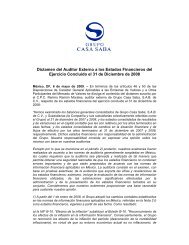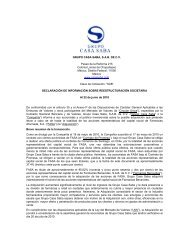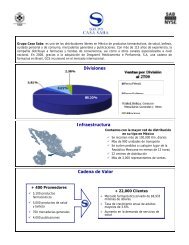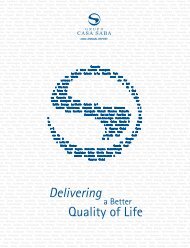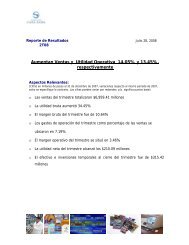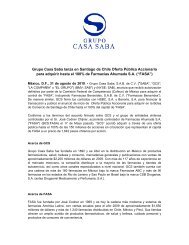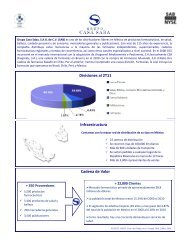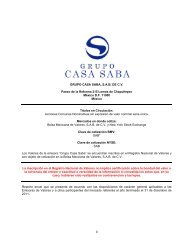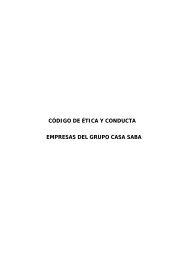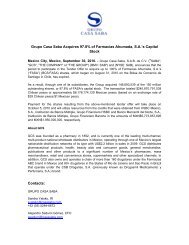FORM 20-F Grupo Casa Saba, S.A.B. de C.V.
FORM 20-F Grupo Casa Saba, S.A.B. de C.V.
FORM 20-F Grupo Casa Saba, S.A.B. de C.V.
Create successful ePaper yourself
Turn your PDF publications into a flip-book with our unique Google optimized e-Paper software.
Table of Contents<br />
Today, the markets in Peru and Bolivia are not contemplated as places for expansion in our business plan. However, once the restriction imposed on <strong>Grupo</strong> <strong>Casa</strong> <strong>Saba</strong><br />
expires, if the Company intends to venture into such markets, it may find a strong and consolidated competitor that may impe<strong>de</strong> our <strong>de</strong>velopment in the drug distribution market.<br />
Risk Factors Related to Our Securities<br />
Our Controlling Sharehol<strong>de</strong>r Has the Ability to Restrict the Payment and Amount of Divi<strong>de</strong>nds. Un<strong>de</strong>r Mexico’s Ley General <strong>de</strong> Socieda<strong>de</strong>s Mercantiles, or<br />
General Corporations Law, <strong>de</strong>cisions regarding the payment and amount of divi<strong>de</strong>nds are subject to the approval of our sharehol<strong>de</strong>rs, generally, but not necessarily, based on the Board<br />
of Directors’ recommendation. Our controlling sharehol<strong>de</strong>r owns 85% of our outstanding Ordinary Shares and, so long as it continues to own a majority of our outstanding shares, it<br />
will have the ability to <strong>de</strong>termine whether or not we will <strong>de</strong>clare and pay divi<strong>de</strong>nds, in cash or otherwise. See “Item 3. Key Information—Divi<strong>de</strong>nds” and “Item 7. Major Sharehol<strong>de</strong>rs<br />
and Related Party Transactions—Principal Sharehol<strong>de</strong>rs”.<br />
Preemptive Rights May Be Unavailable to Hol<strong>de</strong>rs of Our ADSs. Un<strong>de</strong>r Mexican law, our sharehol<strong>de</strong>rs are affor<strong>de</strong>d preemptive rights. In the event that we issue<br />
new Ordinary Shares for cash, our sharehol<strong>de</strong>rs will have the right to purchase the number of Ordinary Shares necessary to maintain their existing share participation. U.S. hol<strong>de</strong>rs of<br />
our ADSs cannot exercise their preemptive rights unless we register newly issued Ordinary Shares un<strong>de</strong>r the Securities Act of 1933 or qualify for an exemption from registration. If U.S.<br />
hol<strong>de</strong>rs of our ADSs cannot exercise their preemptive rights, the interests of these hol<strong>de</strong>rs would be diluted in the event that we issue new Ordinary Shares for cash. We intend to<br />
evaluate, at the time of any offering of preemptive rights, the costs and potential liabilities associated with registering any additional Ordinary Shares un<strong>de</strong>r the Securities Act of<br />
1933. We cannot assure you that we will register any new Ordinary Shares that we issue for cash. In addition, although the <strong>de</strong>posit agreement provi<strong>de</strong>s that the Depositary may, after<br />
consulting with us, sell preemptive rights in Mexico or elsewhere outsi<strong>de</strong> the United States and distribute the proceeds to hol<strong>de</strong>rs of ADSs, such sales are not allowed un<strong>de</strong>r current<br />
Mexican law.<br />
The Protections Affor<strong>de</strong>d to Minority Sharehol<strong>de</strong>rs in Mexico are Different from those in the United States. Un<strong>de</strong>r Mexican law, the protections affor<strong>de</strong>d to<br />
minority sharehol<strong>de</strong>rs are different from those in the United States. In particular, the law concerning fiduciary duties of directors is not fully <strong>de</strong>veloped, there is no procedure for class<br />
actions or sharehol<strong>de</strong>r <strong>de</strong>rivative action, and there are different procedural requirements for bringing sharehol<strong>de</strong>r lawsuits. As a result, in practice, it may be more difficult for our<br />
minority sharehol<strong>de</strong>rs to enforce their rights against us or our directors or controlling sharehol<strong>de</strong>r than it would be for sharehol<strong>de</strong>rs of a U.S. company. In accordance with the Ley <strong>de</strong>l<br />
Mercado <strong>de</strong> Valores, or the Mexican Securities Market Law, as amen<strong>de</strong>d, we amen<strong>de</strong>d our bylaws to increase the protections affor<strong>de</strong>d to our minority sharehol<strong>de</strong>rs in an effort to try to<br />
ensure that our corporate governance procedures are substantially similar to international standards. See “Item 10. Additional Information—Amendments to the Mexican Securities<br />
Market Law—Bylaws”.<br />
You May Be Unable to Enforce Judgments Against Us. We are a corporation with variable capital (sociedad anónima bursátil <strong>de</strong> capital variable) organized un<strong>de</strong>r<br />
the laws of Mexico. A majority of our assets and operations are located, and a majority of our revenues are <strong>de</strong>rived from sources, outsi<strong>de</strong> of the United States. All of our directors and<br />
officers resi<strong>de</strong> outsi<strong>de</strong> of the United States and all, or a significant portion of, the assets of these persons and of our Company are located outsi<strong>de</strong> of the United States. As a result, it<br />
may not be possible for sharehol<strong>de</strong>rs to effect service of process within the United States upon such persons or upon us, or to enforce against them or against us judgments by U.S.<br />
courts predicated upon the civil liability provisions of the U.S. fe<strong>de</strong>ral securities laws or otherwise. As of this date, there is no effective treaty between the United States and Mexico for<br />
the reciprocal enforcement of judgments issued in the other country. Generally, Mexican courts would enforce final judgments ren<strong>de</strong>red in the United States if certain requirements are<br />
met, including the review in Mexico of the U.S. judgment to ascertain compliance with certain basic principles of due process and the non-violation of Mexican law or public policy,<br />
provi<strong>de</strong>d that U.S. courts would grant reciprocal treatment to Mexican judgments. Additionally, we have been advised by our Mexican counsel that there is doubt as to the<br />
enforceability, in original actions in Mexican courts, of liabilities predicated in whole or in part on U.S. fe<strong>de</strong>ral securities laws as well as to the enforceability in Mexican courts of<br />
judgments of U.S. courts obtained in actions predicated upon the civil liability provisions of U.S. fe<strong>de</strong>ral securities laws.<br />
12



